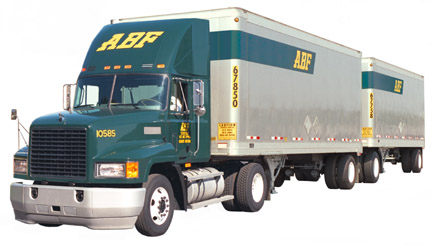 ABF Freight System, Inc., today announced its support of a sustainability program to reduce both fuel consumption and emissions. Introduced by the American Trucking Associations, the far-reaching program of initiatives is designed to provide essential freight transportation services to the North American economy while reducing societal impact under the banner "Trucks Deliver a Cleaner Tomorrow."
ABF Freight System, Inc., today announced its support of a sustainability program to reduce both fuel consumption and emissions. Introduced by the American Trucking Associations, the far-reaching program of initiatives is designed to provide essential freight transportation services to the North American economy while reducing societal impact under the banner "Trucks Deliver a Cleaner Tomorrow.""Because ABF implemented many of the program's initiatives more than 30 years ago, we can attest to the numerous benefits that accrue from widespread adoption of these measures. Since 1976, ABF has voluntarily limited the maximum speed of its trucks, which reduces fuel consumption and emissions, partially offsets fuel economy degradation of the newer engines, and contributes to our impressive safety record. Beginning in 1994, when the technology was available to prohibit discretionary engine idling, all new equipment purchases included computerized idle shutdown, another step to insure ABF's long-standing no-idling policy was observed. As a participant in SmartWay since 2006, we are pleased and proud that the ATA is recommending these common sense practices for all carriers," says ABF President and Chief Executive Officer Bob Davidson. "This program will ensure that the trucking industry continues doing its part to reduce its environmental impact. And ABF will continue to lead the way, adding to its already best-in-class records in highway safety and cargo care."
"By limiting our trucks to a maximum speed of 62 mph, each ABF truck annually emits 33.5 fewer tons of carbon dioxide than identical trucks operating at 68 mph," says Gary Hunt, ABF vice president, equipment and maintenance. Moreover, ABF has reduced fuel consumption and enhanced its operational efficiency with practices that include a strict equipment maintenance schedule and an aggressive equipment replacement program. "The average age of our road tractors is one and a half years. This new equipment produces dramatically fewer emissions of particulate matter and oxides of nitrogen than older equipment," Hunt continues. "In fact, estimates indicate that it would take 60 tractors with 2007-compliant engines to equal the sulfur-derivative emissions of one 1988 model tractor."
ABF was previously recognized for its outstanding environmental performance by SmartWay Transport Partnership, a voluntary partnership between the Environmental Protection Agency and various freight industry sectors. The SmartWay program creates strong market-based incentives for motor carriers and shippers to improve their environmental performance by becoming more efficient in their fuel usage. "In our first year in the program, the EPA awarded ABF a fuel efficiency/environmental performance score of 1.25 -- the highest score allowed. It was affirmation of the program that we already had in place," says Hunt. By 2012, the SmartWay initiative aims to reduce carbon dioxide emissions by up to 66 million metric tons and nitrogen oxide emissions by up to 200,000 tons per year.
The ATA is committing itself to a series of measures that together can reduce fuel consumption by 86 billion gallons and CO2 emissions of all vehicles by 900 million tons in the next 10 years. Details of the ATA's Trucks Deliver a Cleaner Tomorrow program are available online at trucksdeliver.org.
No comments:
Post a Comment